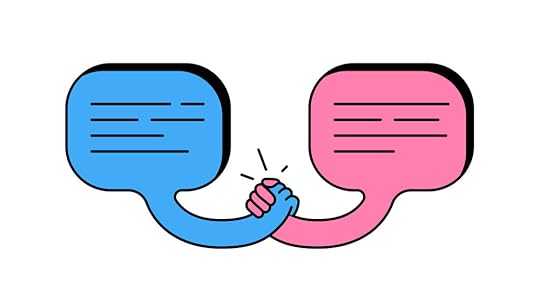Matthew Dicks's Blog, page 172
January 28, 2020
The tough questions
In the midst of math lesson on decimals, a student asked me:
“It is weirder to be able to burp on command or not be able to burp on command at all?”
Because when you teach elementary school, the level of discourse can sometimes elevate to truly extraordinary levels.
For the record, it’s much weirder to not be able to burp on command. Making yourself burp is something most people can do.
My student seemed slightly disconcerted by this knowledge.
But she’s multiplying decimals brilliantly.

January 27, 2020
Free The Nipple
Earlier this month, the Supreme Court rejected a challenge to a Laconia, New Hampshire city ordinance banning women from appearing topless in public and acknowledged that the law treats men and women differently.
A group with the motto “Free The Nipple” argued that topless bans are discriminatory and violate the Constitution by holding women to a different standard, as men are legally allowed to be shirtless in public.
The New Hampshire Supreme Court upheld their convictions, saying the male and female sexes “are not fungible” and the public exposure of the female breast “almost invariably conveys sexual overtones.”
I’m not going to try to argue that the female breast does not “invariably convey sexual overtones.” For me and many others, it does. My mind translates the image image of a woman’s breast into sexual overtones.
The New Hampshire Supreme Court is right.
But this is not the fault, nor the problem, of women who are demanding rights that are equal to men. Simply because a certain segment of the American public considers the breast a sexualized part of a woman’s anatomy does not mean that she should not enjoy equal protection under the law.
Those of us for whom a female breast conveys sexual overtones simply need to grow up and deal with it. In fact, the female breast is not unlike many other parts of the human anatomy. A short skirt, a plunging neckline, or a form fitting dress also invariably contain sexual overtones. For some, bare feet, tattoos, and even an exposed elbow convey sexual overtones. And yes, for some, the sight of a bare chested man (depending on the condition of his bare chest ) clearly conveys sexual overtones.
Why should the female breast be treated any different?
Besides, there’s no logic behind any of this. On a beach, a woman can legally expose about 90% of her breast so long as the nipple is concealed, which makes absolutely no sense at all. This is not an ordinance against bare female breasts. It’s really an ordinance banning the exposure of female nipples and the area immediately surrounding the nipple.
It’s insanity.
In some Middle Eastern countries, women are forced to wear burkas that cover every inch of their bodies because their entire bodies are perceived to convey sexual overtones. Most Americans find these restrictions reprehensible, but the difference is only in the placement of the legal limit.
Requiring a woman to cover her entire body?
No way. Patriarchal and extreme.
Requiring a woman to cover her nipple and a 2-3 inch diameter of skin around the nipple?
Completely reasonable.
I’m not advocating for public nudity. I simply want and expect equal protection under the law. If a man can expose his chest in public, so, too should a woman if she so chooses. If you can’t accept this, then men need to cover their chests, too. Or at least their nipples and a certain degree of skin around the nipples.
Or we could just do this:
If the sight of a female breast gets you all hot and bothered, grow up and deal with it. Look away if you’re offended. But deal with it. You can look at things that make you think about sex without immediately requiring sex or being transformed into some kind of sexual deviant.
Fifty years ago the sight of an interracial couple offended some Americans. Twenty years ago the sight of two men or two women kissing in public sent shock waves through the systems of some people.
Both of these things still offend some bigots today.
The exposure of the female breast is no different, Yes, at this moment in history, in this particular country, the exposure of the female breast conveys sexual overtones for some people.
Too bad. Get over it.
Women deserve the same rights and privileges as men, even if such privileges makes some Americans think about sex.

January 26, 2020
The Samsung logo got my head spinning
Charlie came downstairs yesterday morning, sat on my lap for our customary five minutes of cuddling and conversation, and then went into the back room to turn on the TV.
“Dad, come quick!” he shouted.
I did. When I arrived, Charlie was standing in front of the television, pointing at the screen. He had yet to turn the TV on, but apparently the cable box had been turned off the previous night but not the TV itself. As a result, the word “Samsung” was floating across the screen, bouncing from side to side.
“What is that? he asked.
A bunch of thoughts flooded my mind.
Wow. He’s reached the age of seven and never seen something as seemingly commonplace as this? Just imagine the multitude of things he has not seen or learned yet. He seems so wise and worldly at times, but in reality, he’s still just a seven year-old boy with lots and lots to learn.
It’s actually a very good question. What is this really? It’s not a screen saver because the screen is black. With the exception of the Samsung logo, the screen is not lit in any way at all.
I could tell him that it’s advertising the brand of TV, but why advertise something that we’ve already purchased? And does it really constitute an advertisement when you bounce the name of the company around the screen at the very moment when people are not watching the screen?
Maybe it’s meant to alert the owner that the TV is still turned on even though it’s receiving no signal. Sort of a warning that electricity is being wasted.
Now that he’s seen this, I can show him the classic DVD logo scene from The Office. Maybe I’ll even explain to him how much I miss Jim and Pam and Dwight and all the rest of the characters from that show and how uncommonly and oddly attached I became to them (and remain attached to them) over the years.
Did you know that there are well over 100 videos on YouTube of deleted scenes from The Office, filled with brand new content, excised subplots, surprising reveals, and more? Did you know that Robert California once planned a threesome with Jim and Pam? Have you seen the prank that Jim and Pam play on Dwight after finding his lost wallet? Watching these deleted scenes is like reuniting with an old friend after years of separation.
With my mind now swimming in thought, my answer to Charlie was a simple one. “It’s nothing, buddy. Want some breakfast?”
There’ll come a time when I will explain this tiny bit of the world to him in a way that is appropriate and fulfilling, but not before sunrise, not when I’m still unsure of the answer to his question, and definitely not while my heart was aching once again for my friends from The Office.
Don’t eat the meatball panini.
Four years ago, I did a TEDx Talk in Natick, Massachusetts entitled “Live Life Like You Are 100 Years Old.”
You can watch it here:
The premise of the talk is that when it comes to decision-making, the current version of yourself is an unreliable decision maker because far too often you don’t consider the length and breadth of your life when making a decision.
Instead, we should try to make decisions based not upon the current version of yourself but the version of yourself that exists in the future.
Imagine the 100 year-old version of yourself. What would they say? How would the 100 year-old version of yourself want you to have lived your life?
I know… it sounds a little weird, but I use this strategy all the time to great effect in decisions both big and small. Recently, I made one of those small decisions that I think illustrates the point well.
Three weeks ago, following our sold-out Speak Up show at the Wadsworth Atheneum, Elysha and I joined about half a dozen friends for celebratory drinks. I found myself sitting at a table amongst friends, sipping my Diet Coke, when it was decided that we would eat.
I was hungry. I hadn’t eaten since early afternoon. But it was after 10:00 PM when the menus arrived at the table, meaning I would likely be asleep within the next hour or two.
Did I really want to eat now?
Then I saw it on the menu: A meatball panini. The description of the sandwich sounded like perfection. I wanted that sandwich.
But did I really want to be eating a meatball sandwich at 10:30 PM?
The version of me sitting at the table very much did, but when I asked my future self what I should do, he told me not to do it. Yes, you’re hungry, but only a little hungry, and you’ll be in bed and asleep before you know it. Do you really want a meatball panini sitting in your belly as lie on bed for the bed overnight?
The answer was no, I did not. So I passed. It wasn’t easy, not because of the hunger or the sandwich, but because of the people at the table, many of whom tried to convince me to eat.
“C’mon, Matt. You deserve it. This is a great night.”
“Just eat half. Bring the other half home.”
“Why go to bed hungry?”
I ignored them all and sipped my Diet Coke and told stories while they ate.
Here’s the best part:
The next morning, I felt fantastic about not eating the meatball panini. I had slept like a baby. Avoided unnecessary calories. Made a positive decision for myself. Aided in my efforts to lose weight. Felt so good about myself.
I woke up as the future version of myself, thankful to the past version of myself for doing the right thing. I actually spoke my thanks aloud, saying, “Good job, Matt of the past. You made a great decision last night.”
That would have been more than enough to justify my decision, but here’s the thing:
I still feel good about avoiding the meatball panini. Three weeks later, I’m still happy about my decision that night. I’m still proud of myself for avoiding the peer pressure of a celebratory meal. I’m just as thankful to the previous version of myself today as I was that next morning.
And when I weighed myself this morning,. I saw that I’ve managed to lose 8 pounds in so far in the month of January. It’s not all meatball panini, of course. I’m working extra hard at the gym every day, and I’ve reduced every meal portion by a little, but as I stepped off the scale this morning, I thought of that meatball panini again, and I was reminded of how good, hard decisions made in the moment can bring long-term happiness in the future.
Admittedly, I would’ve been happy had I eaten that meatball panini three weeks ago. For an hour or so, I would’ve experienced all the joy associated with a delicious meal and the satiation of hunger. But given the time of day and my longterm goals, I decided against it, and instead, I’ve enjoyed three weeks of happiness instead.
Three weeks of thankfulness and pride that I did the right thing for my future self.
When we forgo momentary pleasure for longterm gains, we are trading fleeting joy for longterm happiness. We trade short-term outcomes for longterm achievement.
It’s an excellent trade.
I’m not proposing that we don’t live in the moment and enjoy ice cream for breakfast on occasion. When I have a book or column due but Charlie asks me to wrestle, I wrestle every time because I know that my future self thinks the fleeting joy of a wrestling match with my boy is worth the risk of missing a deadline.
Some momentary pleasures must be embraced whenever possible.
But a meatball panini? Not so much.
If you watched my TEDx Talk, you know that I am a person who very much looks to make each moment of his life meaningful in some way. But I also measure those in-the-moment decisions against the future, and when those decisions in the moment are not useful to my future self and the 100 year-old version of myself does not approve, I try like hell to adjust my decision making.
And I’m always happier for it.
January 25, 2020
Reaching across time and space
Last night we celebrated Clara’s last meal as a ten year-old girl. She turns eleven today.
During dinner, Clara asked about the day she was born, so Elysha and I spent the rest of the meal telling Clara and then Charlie the stories of the days they were born. Both stories were lengthy, filled with amusing disagreements, stubborn deliveries, placental abruptions, multiple cheeseburgers, and more.
The kids asked a lot of questions, and we answered most of them.
The stories of those two memorable days, written on the day of their births and immediately thereafter, can also be found on my blog Greetings Little One, as well as within the six volumes of text that were created from the blog last year.
I’m happy to report that the stories are alive and well for our children and beyond.
But it got me thinking about the day I was born.
My mother passed away in 2007, so my link to that first day of my life is gone. Mom never told me much about the day I was born, and now that story is lost forever. All I have left is my baby book. It contains the newspaper clipping announcing my birth as well as tiny bits of information.
I was born on February 15, 1971 at 4:49 AM.
My eyes were grey. My hair was brown. I weighed 6 pounds, 8 ounces. I was 19.5 inches long.
There was snow on the ground on the day I was born.
Under “Prominent People” on the day of my birth, my mother listed:
Ralph Nader
Charles Manson
Lt. William Calley
Richard Nixon
For the record, two of those people were mass murderers and one was a corrupt and disgraced President. Not exactly baby book material.
Under “Fashions and Fads,” Mom listed:
midi
maxi
headbands
bellbottoms
pant suits
Under “Family News,” Mom wrote:
Paulette (her sister) expecting 3-13-71
Memere (her grandmother or mine) preparing to leave for Georgia
There is a list of visitors to the hospital, which is mostly family whose names I recognize but a few that I do not. Friends of my mother and father, I suspect.
There’s also a last of gifts. Everything you would expect to see on a list like this, plus stranger items like sweater suits and a bunting set. Also the baby book from which I am reading now.
As I grew, Mom continued to write. I learned that I started speaking at 5 months, and my first word was “Daddy.”
I was eating cereal at one week, fruits and vegetables at one month, started drinking skim milk at three months, and started eating meat at four months.
Sounds bizarre by today’s standards. Right?
My favorite things included “sucking my thumb,” “baths in the tub with daddy,” and “playpen.”
Mom went on to write about the first six years of my life, summarizing each year on my birthday with a paragraph or two before stopping prior to my seventh birthday. She wrote about visits to zoos and trips to the White Mountains of New Hampshire, Vermont, and New York. She wrote about the heart murmur detected during my fourth visit to the doctor and the bottle of paregoric (a regulated narcotic today) that I drank when I was 10 months old, which led to me having my stomach pumped. She wrote that I was a “jolly baby.” A “rebellious little boy.” A “handful.”
When I read these words, I read slowly. I treasure each and every one. They are like gold to me, because she is gone, and this is all that I have:
The few, scattered stories that she told me about my early days and this small collection of words, written by a 21 year-old mother whose husband had just returned from Vietnam.
They tell the small, incomplete story of a man and woman in love, spending time with their families and each other, loving their children and their lives together.
My mother and father would be divorced by my eighth birthday, so I don’t remember much of the love contained in this book. Most of these days are lost to me. Days when my parents loved each other and loved me. Days when we were together as a family.
I’m so grateful to have this little bit of personal history. The voice of my mother, reaching across time and space, telling me about how a snowstorm knocked out the power on my sixth birthday, forcing us to eat cream cake with my grandparents with us by candlelight. Reminding me of the puppy named Bruin that I found under my Christmas tree when I was two. Telling me about how fiercely and frustratingly independent I was at a very young age, leaving the home and roaming the fields and forests behind our home whenever possible.
It’s not much. And it tells nothing about the day I was born or my first day at school. It says nothing about my first baseball game or the first time my father threw me atop a horse. Things I wish Mom could tell me today.
We told Clara and Charlie the stores of their births last night while we ate dinner, and if they’ll listen, we’ll tell them again and again. Many times. We’ll tell them those stories and all the rest that we can remember and even the stories we can’t. The hundreds of thousands of words that I’ve written down and preserved in books and blogs, so that someday, through the magical, telepathic powers of the written word, I can reach across time and space and speak to my children again, and remind them about the love and joy and hilarity of our lives today, and hope and pray that it will be enough to answer all their questions and then some.
Happy birthday, little one. Ten was great, and I know eleven will be, too.

January 23, 2020
Go be a kid again.
After the Saturday snowstorm, Clara, Charlie, and I went outside to build snowmen, and I must say, if you have the chance to build a snowman at some point in the future - or do anything that you loved doing as a child but haven't done since you were young - please do it.
Building those snowmen with my kids brought back a tumult of childhood memories and a rush of pure joy as the current version of me and the childhood version of me stepped into the same place for a moment and shared a single mind.
It was glorious. Fun and challenging and oh so satisfying.
For a little while, I was once again running in my snow-covered childhood backyard. Wandering the snowy fields of my grandparent's home. Tunneling into snow drifts at recess.
I remembered how shocked I was as a child to find green grass hiding under a blanket of white snow. How thrilled I was when my mother gave me a carrot for my snowman's nose. I remembered - for the first time in forever - how we would jump off the barn roof into enormous drifts of snow, simultaneously terrified and trembling with excitement.
I remembered the socks I wore on my hands as mittens. The bread bags insulating my feet. The way my jeans would freeze into odd angles after hours spent outdoors.
Not only did all these memories come back, but the feelings of those snowy, childhood days filled my heart and mind. The vibrating joy over something as simple as New England snow.
Find the things you loved in childhood and give yourself a chance to enjoy them again.
You won't be disappointed.




January 22, 2020
Speak Up Storytelling #82: John Smith-Horn
On episode #82 of the Speak Up Storytelling podcast, Matthew and Elysha Dicks talk storytelling!
In our follow up segment, we share about upcoming events in the Speak Up realm and thank listeners for some unexpected kindness.
In our Homework for Life segment, we talk about the power of anecdotes and illustrate how they can be just as useful as finding stories in your Homework for Life entries.
Next we listen to a story by John Smith-Horn.
Amongst the many things we discuss include:
Excellent opening sentences.
Delivering the story as if you are re-living the story
The right moment to spoil a surprise
Suspense through anticipation
The curse of knowledge
Next we answer a question from a listener about The Moth.
Lastly, we each offer a recommendation.
RECOMMEDATIONS
Elysha:
Read Brightly: https://www.readbrightly.com
Matt:
Lady Gaga's Emotional Speech on Surviving Sexual Assault and Mental Health:
https://www.youtube.com/watch?v=14KX7xOJsqE
LINKS
Purchase Storyworthy: Engage, Teach, Persuade, and Change Your Life Through the Power of Storytelling: https://amzn.to/2H3YNn3
Purchase Twenty-one Truths About Love: https://amzn.to/35Mz1xS
Homework for Life: https://bit.ly/2f9ZPne
Matthew Dicks's website: http://www.matthewdicks.com
Matthew Dicks's YouTube channel:
https://www.youtube.com/matthewjohndicks
Matthew Dicks's blog:
http://www.matthewdicks.com/matthewdicksblog
Subscribe to Matthew Dicks's weekly newsletter:
http://www.matthewdicks.com/matthewdicks-subscribe
Subscribe to the Speak Up newsletter:
http://www.matthewdicks.com/subscribe-speak-up
Subscribe to Matthew Dicks's blog:
http://www.matthewdicks.com/subscribe-grin-and-bare-it

January 21, 2020
Feedback is always good, even when it’s bad.
Last Saturday, Elysha and I produced our first show at the Wadsworth Atheneum in Hartford, CT. It featured a fantastic night of stories and a raucous, sold-out audience.
We had to turn away people at the door.
At the end of the night, my friend, Eddie, stopped me to comment on my performance. He said some kind things to me about my story, but then he mentioned something about me tugging on my shirt while onstage.
A storyteller who had performed that night immediately interceded and tried to stop him from finishing what he was saying.
“It’s no big deal,” she said. “It’s just something he does.”
Eddie - whose seen me tell stories onstage many times - persisted, explaining that when I’m performing, I oftentimes tug on the bottom of my shirt on the left side. Always the left side.
The storyteller didn’t think I needed to hear this, but I was incredibly grateful to Eddie for offering the feedback.
Positive or corrective, I adore feedback. I especially adore feedback when delivered in the way in which Eddie delivered his feedback:
Positive first, then corrective.
Eddie let me know that he appreciated my performance and was specific about the aspect that he liked most. This helps to reinforce things that I should continue to do when telling stories.
Then he offered me a note. Something I had never heard before, and most importantly, something I had never noticed before.
I’ve been telling stories, delivering keynotes, and doing standup for almost a decade. I’ve been doing author talks on stages around the world for even longer than that. I’ve stood on hundreds of stages and told hundreds of stories to audiences ranging from the dozens to the thousands. No one has ever mentioned that I have a habit of tugging on my shirt when performing.
It’s also odd given the fact that I never feel nervous onstage, so a nervous tick like shirt tugging is very out of character for me.
But if it’s something I do, I want to know so I can stop.
Admittedly, the storyteller was right in saying it’s not a big deal, and it’s likely going unnoticed by most people. Elysha has watched me perform far more often than Eddie, and she’s never noticed.
But if Eddie and this storyteller have noticed, there must be others who have noticed, too. Probably lots of people. But no one has ever mentioned it before, and this surprises me.
Maybe Eddie is just exceptionally observant, and the number of people as observant as Eddie in this world is small.
Maybe people have noticed but said nothing because the opportunity to say something never presented itself. They were exiting the theater or didn’t know me well enough to offer their feedback.
Ot maybe they’ve noticed but were reticent about offering me feedback. Afraid of how it might make me feel. Nervous about what I might say.
I suspect that many folks have fallen into this latter category. They may have noticed this odd habit of mine but didn’t feel it was appropriate to mention it.
“Who am I to tell Matt how to improve his performance? I’ve never told a story onstage before.”
But I have always craved feedback and admired those who do it well. I met my good friend, David, at the opening performance of a rock opera that a partner and I wrote more than a decade ago. His wife and Elysha had been friends since high school, but we had never met. David - a writer - had actually come to the show expecting to hate it, but instead, he loved it.
When we met for the first time at the end of the show, he told me how much he liked it. Told me how surprised he was to have liked it. Then he offered me three notes on the show, all of which were excellent.
We’ve been friends ever since.
Feedback is not a bad thing to offer a person, especially when it is preceded by a positive comment and offered with the genuine desire to help someone improve at whatever they are doing.
And maybe that storyteller is right. Sometimes it really is “no big deal.” Sometimes it’s just something I do. Sometimes I might even disregard the feedback, as I did that night when another person offered a suggestion following my performance. I smiled, thanked the person for their time, and moved on, knowing their suggestion was not for me.
But Eddie’s feedback? I’ll be absolutely be paying attention to my left hand and my shirt moving forward. As a storyteller, my goal is to activate your imagination. Make you see my world through your mind’s eye. I want my audience to get lost in my story. Forget where they are and even who they are.
Tough to do that if the guy standing in front of you is tugging on his shirt.
A physical distraction of any kind can break the spell that I am trying to cast, so for that reason, Eddie’s feedback was incredibly important to me, and I am incredibly grateful to him for offering it.
You either want people to only say nice things to you - which is the position of many, many people, I think - or you genuinely want to improve and are prepared to hear about your flaws.
I am always read to hear about my flaws. I am always seeking ways to improve. By leaps and stumbles and tiny shuffles forward, every step in the right direction is a step ahead of the competition. That can’t happen without the generosity of observant folks like Eddie and David who are willing to tell me what they think and hear and see.
That storyteller was wrong. Improve is always a big deal, even if it’s as simple as a tug on my shirt.

January 20, 2020
Just a little mind terrorism
A week ago, a friend was dealing with an impossible situation involving a truly rotten person and asked me for some advice in terms of how to respond to her rotten words.
I offered two suggestions that work in almost every verbally combative situation wherein the opportunity to change someone’s mind or otherwise improve your standing in some way does not exist.
Those rock and a hard place, no-win scenarios.
When caught in one of these impossible situations, simply say to the rotten person:
“Oh. You’re one of those people.” Then just walk away. Your verbal combatant may shout something in response as you walk away, but just keep walking. Don’t respond. Don’t even look back.
This is the kind of statement that will likely reverberate in their mind long after you’re gone. And it works on almost everyone:
Rude store clerks, irate soccer moms, ignorant cousins, stupid neighbors, and angry strangers.
If you have some familiarity with the person and you want to be especially cruel, you can use this slight but devastating variation:
“Oh, I guess everybody was right about you.” Then walk away. Again, your verbal combatant may respond in some way, but just keep walking. Never look back.
I haven’t used either of these options very often, but when I have, the results have always been excellent. My opponent is either silent as I walk away or thrown into a fit, demanding to know what I meant.
Both of those responses are excellent.
My friend, Steve, has referred to me as a “mind terrorist.”
I thought it was an amusing description, but I was never really sure what he meant until I just proofread what I wrote.
Mind terrorist. I get it.

January 19, 2020
Jesus would not like these Christians
Apparently, this photo was too much for the religious bigots who forbid gay people from learning stuff in their school and loving whoever they want and even existing and stuff.
In fairness, Whitefield Academy (which already sounds racist) claims that this display of rainbow confectionery was the last straw in a series of incidents, which might be true, but still, a rainbow cake was perceived as egregious enough to constitute the last straw?
The rainbow cake should be no straw.
The rainbow cake should instead be a delicious treat, designed to celebrate a teenager’s birthday, and perhaps serving as an expression of love and support for people whose lives are made difficult by the likes of her stupid English teacher, hateful band director, and ignorant Algebra tutor, all of whom work for this bigoted, ignorant, intolerant institution.
Maybe she was standing in sugary opposition to the students in her school who undoubtedly express hatred about boys kissing other boys’ lips and girls touching other girls’ boobs.
Oddly, it doesn’t even appear that the young lady is gay. She may have only been expressing her love and support for people who are discriminated against by at least some of her teachers, school administrators, and fellow students.
It’s also possible that she simply likes rainbows.
Either way, all of this was too much for the administrators of this Christian school, so they decided to upend her life, remove her from her friends, and send her packing.
It’s the strangest thing:
These bigoted Christians who can’t abide the existence of anyone in the LGBTQ community seem to know absolutely nothing about Jesus. They hang their anti-gay bigotry on a book of the Old Testament that also forbids working on Sunday under penalty of death as well as the intermingling of cotton blends.
Literally.
They seem to completely and conveniently ignore the appearance of Jesus on the scene in the New Testament and his instance to love thy neighbor, turn the other cheek, judge not lest ye be judged, and basically love everyone, goddamn it.
These people somehow think that if Jesus was running their school, he would also kick this fifteen year-old girl to the curb.
I may not believe in God, but I’ve read The Bible from cover to cover three times, and I’ve read the Books of Matthew, Mark, Luke, and John many more times than that. I can assure you that there is no way Jesus would kick this rainbow-loving girl out of the school.
There’s also no way that we would condemn the LGBTQ community.
I suspect that if Jesus returned to Earth today, he would instantly and somehow nonviolently kick the asses of every bigot who has made the life of any member of the LGBTQ community difficult in any way.
As a reluctant atheist, I hope that comes to pass. While I’m not a fan of the vengeful, wrathful God of the Old Testament, I would have no problem with the Jesus of the New Testament returning to the Earth and straightening out these bigots and hate-mongers.
It’s so odd that the people who act the least like Christians are the super Christians. The ones with biggest churches and prettiest schools and lots and lots of hatred and bigotry and condemnation for people unlike themselves.




